Thought Leadership Studio Podcast Episodes:
Matching Marketers to Companies with Behdad Jamshidi
Episode 79 - Strategic Matchmaking in Marketing: Behdad Jamshidi on Finding Passionate Partners, Leveraging AI, and Advancing Online Messaging
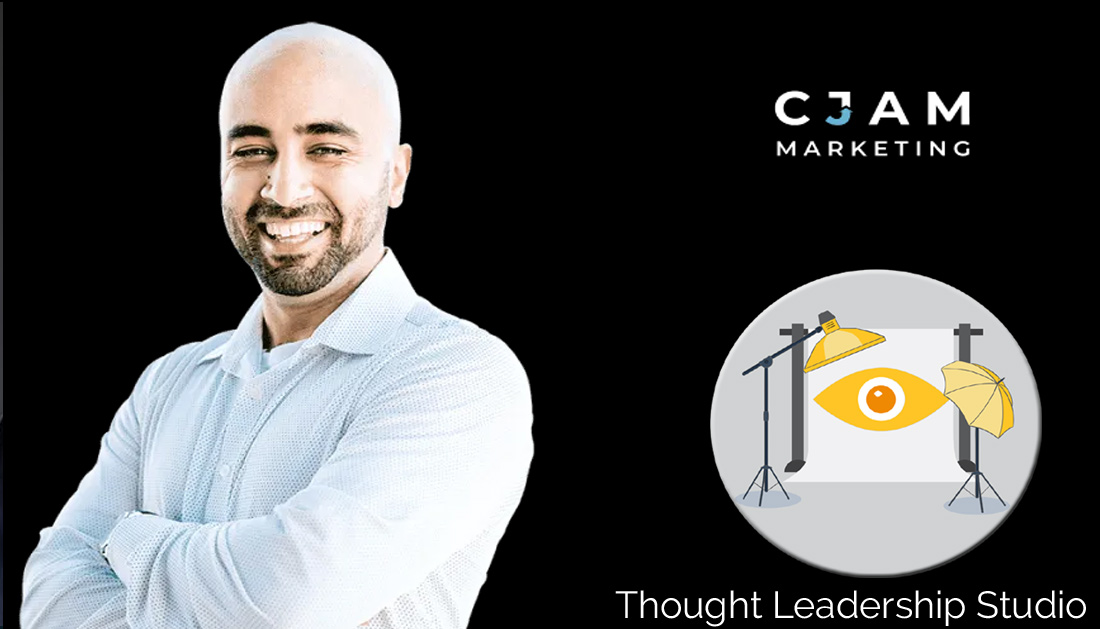
#branding, #consulting, #digitalnomads, #entrepreneurship, #innovation, #interview, #interviews, #marketing, #marketingresearch, #marketingstrategy, #strategicthoughtleadership, #thoughtleadership, #thoughtleadershipmarketing
Or Click here to listen or subscribe on appWhat this episode will do for you
:- Meet Behdad Jamshidi, the Marketing Matchmaker: Discover Behdad's journey as an award-winning marketing strategist and founder of CJAM Marketing, and his unique approach to connecting businesses with the right marketing partners.
- Building Successful Marketing Partnerships: Learn the importance of finding marketing partners who are passionate and have a long-term mindset, and how this can drive sustainable business growth.
- The Role of AI in Modern Marketing: Explore the innovative use of AI in marketing, including AI-supported content and design, and how these technologies can enhance marketing strategies.
- Specialization and Strategy: Understand why hiring specialized marketing partners is crucial and how it can fast-track your marketing efforts to achieve better results.
- Advancing Online Messaging: Gain valuable insights from Behdad on improving your online presence and messaging, with practical recommendations for businesses at various stages of growth.
Behdad Jamshidi.
In this episode, I'm excited to introduce Behdad Jamshidi, an award-winning marketing strategist and the founder of CJAM Marketing.
Behdad, known for his expertise in digital marketing, branding, and strategic planning, is a master matchmaker in the marketing world. With a unique ability to bridge the gap between businesses and the right marketing partners, Behdad ensures that each partnership is built on passion and a long-term mindset. His innovative approach includes the use of AI-generated content and design, keeping his strategies at the cutting edge of marketing technology.
In our conversation, Behdad delves into the importance of finding specialized marketing partners and the impact of passion and commitment on long-term success. We explore how businesses can fast-track their marketing strategies by hiring the right partners and the role of AI in modern marketing.
Some of Behdad's coordinates:
Curated Transcript of Interview with Behdad Jamshidi
The following partial transcript is lightly edited for clarity - the full interview is on audio. Click here to listen.
Chris McNeil: I'm Chris McNeil, with Thought Leadership Studio, and I'm sitting here across Zoom and across an ocean with Behdad Jamshidi who's an award-winning marketing strategist and founder of CJAM Marketing. He helps businesses find marketing partners and grow through these marketing solutions. He has expertise in digital marketing, branding and strategic planning, and known for his excellence and attention to detail. He's also led numerous successful campaigns and is a sought after speaker and thought leader. Welcome Behdad. Great to have you here.
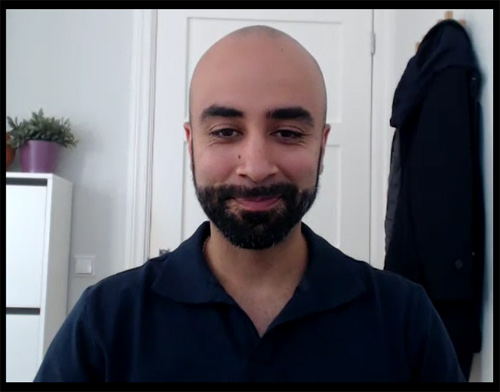 Behdad Jamshidi: Thanks for having me, Chris. I'm excited to be here.
Behdad Jamshidi: Thanks for having me, Chris. I'm excited to be here.
Chris McNeil: So you help companies find marketing agencies - you're kind of a matchmaker in that sense, is that correct?
Behdad Jamshidi: Yeah, absolutely.
The Matchmaker of Marketing: Behdad Jamshidi on Connecting Businesses with Agencies
Chris McNeil: So what led you to this path? Was there a pivotal moment or a turning point that opened this path for you and put you on the road to where you are now doing this?
Behdad Jamshidi: Yeah, I mean a lot of things kind of added up and then that pivotal moment happened.
So I think you already know I used to be an engineer and I used to do business consulting for mid-size companies, but on the marketing side, I initially started out doing websites, Google ads, SEO for small businesses. But I very quickly realized that I didn't enjoy doing a DR websites on the weekend. That was not something that was interesting to me. I enjoyed my full-time job, but as I went through that and started looking for different partners to work with, say someone to do the website piece for a customer of mine, I started realizing most marketing agencies didn't understand business and most business people didn't understand marketing and whenever you put them in the same meeting, they didn't speak the same language.
 Agencies would pick up work that they shouldn't pick up, typically good at one to three things. And so that gave me the idea of like, well, there's a gap here and maybe someone can bridge that gap by helping businesses match with the right marketing partners. And over the years it started out with agencies, now it's with fractional CMOs and I have different consultants for copywriting and different things like that. And it's all about just being that bridge or that connector in that space.
Agencies would pick up work that they shouldn't pick up, typically good at one to three things. And so that gave me the idea of like, well, there's a gap here and maybe someone can bridge that gap by helping businesses match with the right marketing partners. And over the years it started out with agencies, now it's with fractional CMOs and I have different consultants for copywriting and different things like that. And it's all about just being that bridge or that connector in that space.
Chris McNeil: That's awesome. So how do you do that? What's your criteria? What do you look for in an organization that informs your decision as to what kind of marketing partner they need and what do you look for in a marketing partner that informs what kind of companies they'd be well suited for?
Behdad Jamshidi: Yeah, really good questions. So the way that I go about on the business side, it's a lot of my experience from the tele side. So going into a business understanding from the top level down on how things are running, it's a lot easier with the businesses I work with now, not as big as the mid-size market that I was working with before, but it's really understanding what the vision is, where they're headed, what kind of resources they have, how they think about marketing, are there certain channels that are working and kind what got them to where they are today.
And then based on where they're trying to go, is the thing they're asking me for going to get them there or do we need to rethink about hey, potentially getting a marketing strategy in place or using different channels that they might've never thought about.
So there's a bit of that consulting piece on the front end to make sure that we are going down the right rabbit hole. So that's on the business side, and if they agree with the way that I think about it to say, Hey, I think you should be doing this. Do you want me to go find the partners for you and match you? And they say yes.
Then on the agency side, I've been meeting, I mean at this point I've met with over 861 different marketing agencies and partners a lot. And so I've always been doing this. I've always been for the last five years, meeting multiple agencies per week or partners and just learning more about them initially it always starts with a 30 minute call. I just want to make sure they have the right values, the right mindset, how they were built, all that different kind of stuff.
And then if I feel like they're partners that potentially have something in them, then I go to a second round and a third round, look at their work, do all that stuff, and then do one hour deep dives with 30 to 35 questionnaires and errors. And some of the things that I look for just at a high level is length of years in business. Number one, if you haven't been in a business as a marketing agency for five years, nowhere near enough time to put the processes and systems in place to actually just be even stable for your customers.
And then number two is the passion. Why are they running that marketing agency that matters? A lot of time, a lot of people are in it just to make a ton of money and then sell in two years. So typically they don't care that much about their customers versus you talk to some agency owners, they're like, I've been doing this for 14 years and I'm going to do it until I decide to sell it when I get a lot older. So they're in it passionately because they want to build this thing and you typically don't see them scaling their agencies really fast because marketing agencies aren't scalable businesses without breaking for the customers on the customer side.
Growing Without Breaking: Tips for Agency Success
Chris McNeil: I wonder how that happens because I've seen in - I used to have an agency myself, and we still have some legacy customers from that - got me more to the consulting and coaching space in Strategic Thought Leadership. But what I've seen is that when agencies grow and take on a lot of customers, they bring on a lot of junior people who don't really know the landscape very well and send these people to the customers and that they just don't really have the experience to understand what to do.
They just kind of do the plus or minus 5% of the norm that they see themselves basically. So if someone's listening to this and they have an agency or their marketer, how would you advise them to grow their business and maintain high level service?
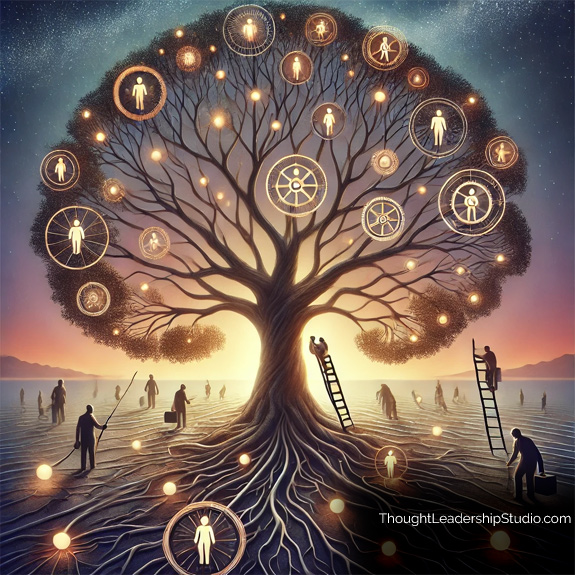 Behdad Jamshidi: So if we're talking about the agency side of things, be really realistic about how fast you can grow without breaking. Typically an agency, and I've read different books from different consultants and talked to different consultants, 10 to 15% is typically the growth rate of an agency where you won't break, you bring on certain people, you give them enough time to learn and you're not breaking your agency business.
Behdad Jamshidi: So if we're talking about the agency side of things, be really realistic about how fast you can grow without breaking. Typically an agency, and I've read different books from different consultants and talked to different consultants, 10 to 15% is typically the growth rate of an agency where you won't break, you bring on certain people, you give them enough time to learn and you're not breaking your agency business.
A lot of the best agencies that I work with, they have set times that they will take on customers. They have every two weeks, they have a certain amount of onboarding. If they can't fit you into this two week slot or the next two week slot, you might be waiting a month and a half to get onboarded. But that's because they built the systems and processes in place so that they don't overload their team and break.
I was just for example, looking for one customer recently, they're in Australia and my network is really strong in North America, a little bit of Europe, but mostly in North America. And I've had agency be like, beta, our team only works before four 30 and we don't want to overwork them, and so therefore we can't take on this customer. Whereas some other agencies would take it on and overload.
I mean if the culture's not fit, they will overload their employees and the customer might not end up being happy about it. Neither are your employees. And over time, that's not a business that's going to be scalable or one that's going to do well in the long term.
Slow and Steady: Sustainable Growth in Marketing Agencies
Chris McNeil: So temper your ambition basically.
Behdad Jamshidi: Yeah, yeah. I understand ...
Chris McNeil: It's a challenging thing to do in business, isn't it?
Behdad Jamshidi: Is it's like if you want to scale really fast and do a lot of crazy things, maybe go into the SaaS space, maybe go into the app space, get some funding that's all about scalability and doing things in the marketing agency space. The best ones are the ones that have slow growth and think about who they want to service and how many people they want to service and not overloading too much.
Chris McNeil: Gotcha. And of course those are alien terms to the VC community.
Behdad Jamshidi: Yes, yes it is.
Chris McNeil: They wants see four digit returns on their investment on such things. And so what's going on in the agency space that you would consider very innovative right now?
Behdad Jamshidi: So there's a lot of brand going on in terms of personal brand building, and I wouldn't say it's innovative. We're kind of moving back to what marketing was before. So during COVID, advertising was huge. You could just advertise on Facebook and Google ads and things would go nuts. Now everyone actually has to go back to marketing. And it's like, okay, well I can't just use one channel to grow actually.
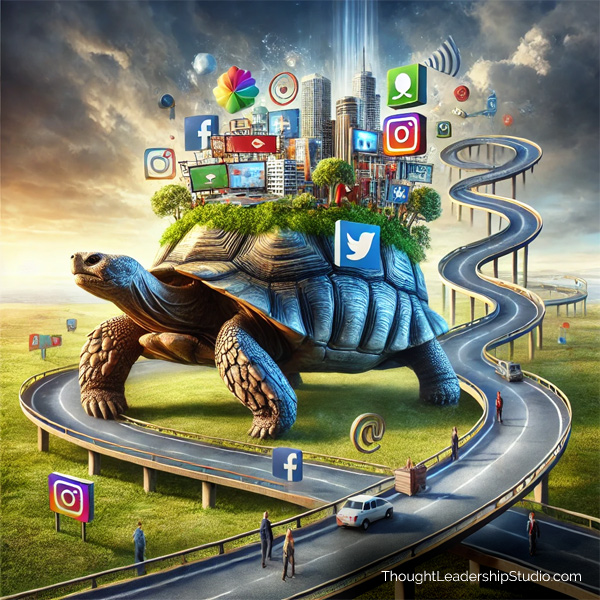 If I do find one channel that's able to grow, how do I disperse that into other channels so I can diversify? Because things are shifting so fast now. So a lot of what I'm seeing is brands actually turning on multiple different channels and trying to create a flywheel effect of all of them working together. And so you're seeing a ton of people doing LinkedIn, brand content, personal brand content, Instagram, all that, different kind of stuff.
If I do find one channel that's able to grow, how do I disperse that into other channels so I can diversify? Because things are shifting so fast now. So a lot of what I'm seeing is brands actually turning on multiple different channels and trying to create a flywheel effect of all of them working together. And so you're seeing a ton of people doing LinkedIn, brand content, personal brand content, Instagram, all that, different kind of stuff.
And then a lot of companies in Europe, agencies in Europe typically build out their own software for their own customers. So whether they're like an SEO agency, they'll build out software where they're literally tracking the spend on each page showing the customer, Hey, we brought this page up to this level. This is how much money you're making on this page. Therefore that's what the value of our SEO service is. There's not a lot of companies doing that kind of stuff.
Chris McNeil: ROI for SEO seems to be a magical black art to a lot of company owners. They just think of somebody with tech skills who magically puts at the top and don't really consider that we have to have the kind of content that's valuable. I'm talking about organic SEO at this point, of course that attracts that. So what's your philosophy? And this relates to thought leadership, this angle, this podcast on harvesting the thinking of a business in order to bring it to the forefront in marketing and show the innovative thinking or lead the marketplace to thinking that favors the business' offerings.
Aligning Internal Resources with Marketing Agency Expertise
Behdad Jamshidi: So the way that I think about it is, let's just talk about the multiple stages of business. So if you're starting out the initial phase is throw everything at the wall and find something that sticks, find your product market fit. At some point you're going to get to seven figures.
If you found that puzzle and that piece out, once you get to that seven figure space, let's say 3 million above, now you got to really start thinking about a marketing strategy. Are you in this for the long game? And if you are, you got to start thinking about how do you build out your brand and your brand becomes every single touchpoint that you have with customers everywhere that they see you and your messaging and all that different types of stuff. And what a lot of businesses take too long to do is they don't go back to the drawing board.
They think because they have a website and they have some words on the website and they have some branding that part's figured out. But no, you actually have to go back and re-figure that out because now you have a ton of new information and you actually can figure out what your customers want.
So you can be even more direct with your marketing at that point. Once you get that in line, and let's say the business gets to that 10 million, 20 million range, now you, you've put leadership in place and most people think that they can find one agency to solve all their problems. That's a myth, especially in the low and mid-market space. Most agencies are really only good at one to three things.
So you have to have a team internally that can bring together multiple things. So whether you have that marketing strategy that's going to focus on social and influencer and let's say SEO, you have to basically find the specialized agencies or partners that can do that type of stuff and bridge that in internally.
And then once you get to the a hundred million dollars mark, at that point, you could probably hire a lot more of those enterprise agencies where you're going to be paying top dollar, but they're going to be taking care of the hiring of the specialists and things in the backend to help move that business forward. And at that point, you probably have a lot of internal resources that you can use as well for your business.
Chris McNeil: That's really good to hear. And I wonder about how you inventory or how you assess those internal resources to inform the agency fit. And by internal resources, I mean the company of a certain size might have thought leaders in the company who have a following on LinkedIn, they have an audience because they're communicating directly to their audience.
You might have a ghost editor, but they're not over delegating to a ghost writer who's putting words in their mouth. It is their words, it is their thinking and it's innovative enough to attract an audience. Or they might have people internally that are good at writing and they write copy, maybe have a really technical innovative product that they have some white papers on, they've done.
Those are a couple of examples, but what else would you look for in terms of what a company has within the role organization to support marketing? And then how do you fit that with maybe filling gaps or how do you fit that with agency resources?
Behdad Jamshidi: Yeah, no, that's a great question. So the first thing that I kind of think about, if you're in that seven or eight figure range, you need to have some sort of strategic resource. So some sort of fractional CMO, someone along those lines that you can call on and get consulting on whenever you need it.
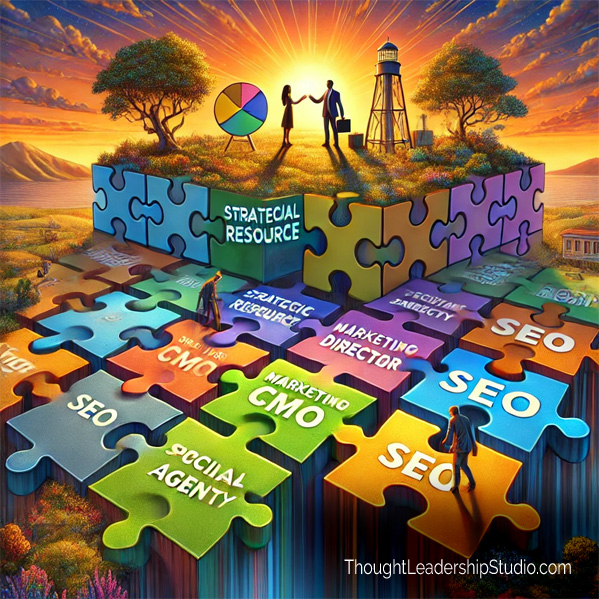 Number two is once you have that fractional CMO in place, you probably already have a marketing director or someone that's a little bit more junior intermediate that would then be reporting to that fractional CMO and doing the execution type work, or they're also overseeing what agencies do and feed that back up to the fractional CMO. So those are the two initial stages that you kind of need.
Number two is once you have that fractional CMO in place, you probably already have a marketing director or someone that's a little bit more junior intermediate that would then be reporting to that fractional CMO and doing the execution type work, or they're also overseeing what agencies do and feed that back up to the fractional CMO. So those are the two initial stages that you kind of need.
And then in terms of other internal resources, look, if your company has a very specific channel that you're really, really good at, let's say social media, probably hire a social media manager or someone in-house at that point because if your entire lifeline relies on that, you need to build systems and processes and have that person there all the time or majority of their time.
But if you have, let's say another channel running like Google or Facebook ads and social media might be something that you're going to start out with versus hiring in-house and having to build the systems and processes and the people and keeping and retaining the talent. You can hire a social media agency and get them to do a lot of that uplifting for you, get it to get a point where it's growing and then maybe you start bringing that in-house yourself with a good strategist or anything along those lines. Typically when I mentioned hiring outsourced agencies is when you need multiple people to get a service completed.
So if you, let's say want to run Facebook ads in-house, what do you need? Well, you need someone that's going to be doing videos. You need someone that's going to be doing creative all the time coming up with creative concepts.
You need someone that's going to edit all that content and do it in multiple different ways. Then you need someone to be doing the ad buying. There's like five to six different roles that you need to run Facebook ads well or Google ads well, right?
And to hire that in-house is very expensive versus spending the three to five grand in the retainer on a Google or Facebook ads agency that will do a lot of that upfront work with you and maybe even charge you some one-time cost to get the video created. You're saving a lot of time on headache and testing by outsourcing, that kind of thing. And you can do that same thing for SEO, social media influencer and marketing and all those other things.
Evolving Marketing Strategies: Workflow Design and Resource Placement
Chris McNeil: Absolutely. So do you assist in this part of it or have you kind of passed the baton along at that point? Do you help with workflow design about what you do internally versus externally matchmaking?
Behdad Jamshidi: Yeah, so in the beginning when I'm talking to customers, I'll talk about what they're doing, the resources, and I'll go, look, I think this thing you need to do this way and this thing. I think an agency would work and here's where I can help with that. Or even a fractional CMO, that kind of stuff. My business is also evolving. I'm building out an entire database very soon that I'm just going to let people submit into and basically have someone just filtering things.
So at some point I'm probably going to have even more contractors on my side of the higher level ones. A lot of marketplaces today where these are let everyone in, and so you don't really know who the actual good marketers are, but for me it's like, okay, can I create a database where it's almost like a roster for me? And then I pull from the roster the people that I really like and create a database where it's like, okay, my customer's coming in.
 I'm like, well, it looks like you need more of a part-time social media strategist versus the full on social media agency. Here's that resource, or you need a designer, here's that resource. And so that's what I'm evolving into so that I can help a customer from every aspect. One other thing that I've done that most people don't think about is those in-House resource placements.
I'm like, well, it looks like you need more of a part-time social media strategist versus the full on social media agency. Here's that resource, or you need a designer, here's that resource. And so that's what I'm evolving into so that I can help a customer from every aspect. One other thing that I've done that most people don't think about is those in-House resource placements.
So versus becoming a recruitment agency like most other people do, I've partnered with a couple in-house recruiters, so when it's like, Hey, this actually looks more like an in-house role that you need, talk to this person, they'll help you with that so that I can help a customer end to end versus trying to give them what only I have, if that makes sense.
Chris McNeil: That makes a lot of sense. And in today's information glut when people can use AI to get to a base minimum of presenting themselves online, sure, it all starts to look alike At a certain point. The trusted curation seems like such a huge value add, how much time you can save from having to sort through those things and find out for yourself what's right as well as the strategy piece and just the outside set of eyes that you bring is how many companies missed a forest for the trees? They don't see their marketing or their presentation to the public.
And I'm trying to remember who the quote came from that marketing is just how your company looks from the outside. But in the hierarchical organizations expect, especially we don't always see how our organization looks from the outside through that lens of the customer's less deep understanding of what we do or we think something's valuable to the customer, they might buy for an entirely different reason until you go over to their side of the table. So that curation piece I think is extremely valuable as well as the strategy piece. So what's your vision for the future of marketing? If you could wave the magic wand and create any change in online marketing you wanted to and it took no effort, how would things be different?
***************************************
The transcript is lightly edited for clarity and is a partial transcript- the full interview is on audio. Click here to listen.
***************************************
Free Stuff and Offers Mentioned in Podcast
***************************************
***************************************